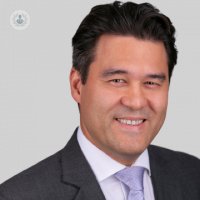Macroglossia, why is my tongue so large?
Written by:Macroglossia is the medical term for an unusually large tongue. Enlargement of the tongue can cause cosmetic and functional difficulties while speaking, eating, swallowing and sleeping. It’s quite uncommon and generally occurs in children.
Mr Juling Ong, craniofacial and paediatric plastic surgeon in London talks about why the tongue becomes enlarged and what can be done about it.

The tongue can become larger than normal due to a number of conditions. These include conditions that you may be born with or that you develop later in life. Overgrowth conditions such as Beckwith-Wiedemann syndrome and vascular anomalies of the tongue can lead to its enlargement.
Other conditions such as Down syndrome, trauma, inflammatory conditions, primary amyloidosis, and congenital hypothyroidism may also be associated with a large tongue.
What are the signs of macroglossia?
A large tongue may result in problems with drooling, speaking, eating and breathing. Over the long term, a large tongue can result in abnormal growth of the jaw and teeth. If the tongue is very large, it can be difficult to keep it inside the mouth, resulting in drying out or cracking and ulceration of the tongue itself.
How is macroglossia diagnosed?
This condition can be diagnosed with a combination of clinical examination and specialist testing. Your doctor will look at your family history and determine the underlying cause.
Does it require treatment in every case? How is it treated?
Treatment depends upon the underlying cause and severity, so may range from speech therapy in mild cases, to surgical reduction in more severe cases.
Medical therapies can be used when the cause is both identifiable and treatable, as in the case of hypothyroidism. In cases where the cause isn’t clear, medical therapies haven’t been useful.
What does macroglossia surgical reduction involve?
Tongue reduction surgery is performed to enable the tongue to function properly within the mouth. The tongue is reduced in size during a procedure which lasts approximately one hour. This operation is performed under a general anaesthetic and most patients will start drinking on the first or second day after surgery and be able to be discharged from hospital after four or five days.
It is recommended to follow a diet of puree consistency for about four to six weeks after surgery to allow the tongue to heal properly.
If you’d like to learn more about macroglossia or would like to see a specialist who can help you with your case, get in touch with Mr Juling Ong.


